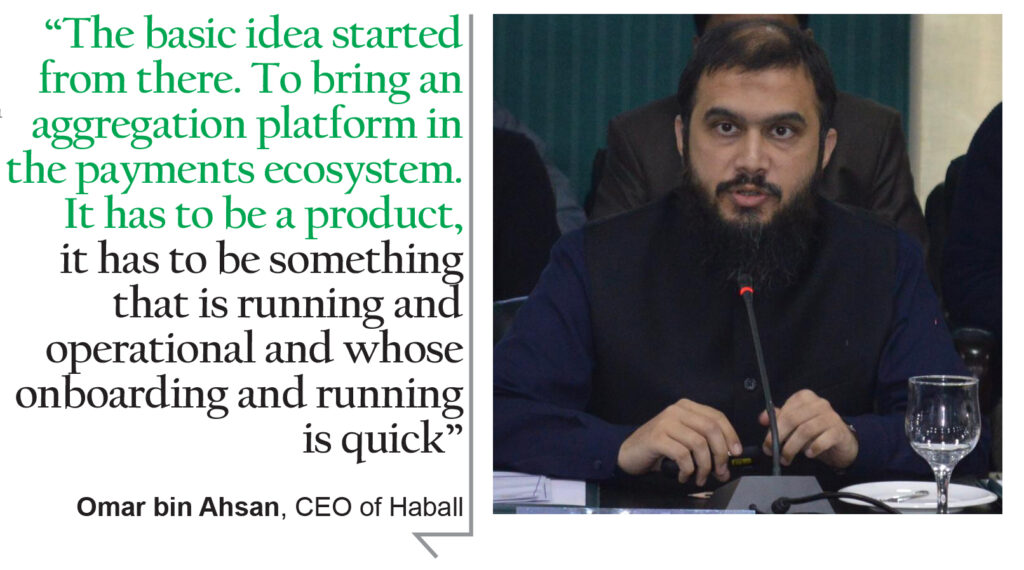If you run a business in Pakistan, your supply chain is most likely run on paper and by paper money. In an economy that is largely informal and one that even has a large informal sector within the formal sector, the majority of the transactions have to be paper-based. That means keeping physical books, depending on memory, goodwill, and handshakes.
This handicap fosters the culture of slowness and inefficiency that plagues businesses across the country. The goal of any business is to create and then meet demand, and to meet demand, you need to be able to supply the product you are peddling. But if the supply chain, the very first part of the cycle that runs the economy is inefficient, the entirety is bound to be sluggish.
The average payment cycle runs 4-6 days for most business to business (B2B) transactions, including purchases, advances, incentives and credit adjustments that are all paper-based. The fact that it can take up to a week to complete the cycle of payments in this economy, from initiating payments and realization of funds, causes delays in the supply chain efficiency, which in turn causes a direct impact on retailer business growth. This also increases cash-handling and cash-in-transit costs, with an added danger of possibility of leakages and theft.
The supply chain is where it all starts, it is the head of the beast and the fount from which the economy flows. Any inefficiencies in it will trickle down to everyone else involved along the process. Which is why, perhaps, it is fitting that Omar bin Ahsan has named his up and coming fintech company Haball.
Haball, which in Arabic means ‘jugular vein,’ provides an ‘agnostic’ platform that aggregates various payment solutions for all parties in the supply chain to make digital payments. In less technical terms, this means that suppliers and distributors can use the Haball interface to make and receive payments in real time online, and bring their entire supply chain into a clean, cutting edge, cloud storage environment.
But how is Haball different from any of the other fintech startups that have tried to digitize the supply chain ecosystem in Pakistan? For starters, they have the blessing of the State Bank of Pakistan (SBP), which intends to use Haball as a key company in its efforts to create a Digital Financial Services (DFS) ecosystem. But how did Haball end up getting the SBP’s nod of approval? And more importantly, what are they doing differently?
Sticking to payments
Haball is not even close to the first startup trying to digitise the supply chain. In fact, Profit has in the past covered startups that are trying to digitise the supply chain by ridding it of its efficiencies. And while this is also a stated goal of the company, it has taken a different angle by focusing more on the problem of payments and financing.
So, for example, under the Haball vision, manufacturers like Nestle could integrate their enterprise resource planning (ERP) system with the Haball platform to connect with distributors to enable digital payments. Within Haball’s cloud platform, the organisation on its corporate portal can create its invoices, create payment IDs, and, if it is integrated with the ERP, the organisation can look at the history of transactions as well.
Essentially, Haball offers a simple interface that lets companies make and receive payments online in real time, and integrate new customers or links in their supply chain without any hassle. Partners on Haball, the name the company has given to distributors and suppliers subscribing to their services, can register themselves via self-service portal and connect with corporates digitally from anywhere and at any time. The onboarding is all done via digital contracting. Relevant partners can keep catalogs updated, add new products, or manage offers and discounts, enabling dealers to order digitally from anywhere at any time.

Not only that, on the cloud platform, Haball also offers a portal for distributors that can place an order with a manufacturer, create digital invoices and make digital payments. Similarly, retailers can also order and make digital payments.
For payments, all aggregated on Haball’s platform, distributors and retailers can use the services of 1Link, which is Pakistan’s oldest and largest Payments Service Provider (PSP) and also connects the ATM network of the Pakistani banking industry. Through 1Link, Haball customers can make payments with 1Link partner banks, which are almost all banks in Pakistan, over the counter, at a bank branch, or via a digital channel of a bank, for instance internet banking and mobile banking.
The relevant party simply sees Haball as a biller. Another option they have is making payments via the National Institutional Facilitation Technologies (NIFT), which acts as a gateway. The difference between 1Link and NIFT is that with 1Link, the customer would have to go to a bank’s digital portal or physical branch to make the payment whereas with NIFT, payments will be within the Haball platform.
Basically, Haball has ingrained itself into the 1Link network, allowing it to act as a platform for payments from any bank in Pakistan. However, it has not stopped there, and is already working on integrating itself with major banks directly. It has already done so with Meezan Bank, where if you have an account, you can simply set up with Haball through your Meezan phone banking app.
The last frontier for payments was branchless banking agents, something that Haball has also managed to integrate, offering services with agents of EasyPaisa and Jazzcash. The next thing on their agenda is to introduce card-based payment gateway for increased customer to business (C2B) transactions.
The SBP factor
Haball is not your usual startup. The SBP, as a regulation setting entity, has at different times had not so pretty encounters with fintech startups. A recent Profit cover story on Innov8 told a similar tale. Haball, however, not just has blessing from the SBP, they are also giving it funds to digitise the entire value chain.
The answer lies in the State Bank’s earlier mentioned bid to create a Digital Financial Services (DFS) ecosystem. The SBP contends that such an ecosystem thrives on two fundamental support structures: infrastructure readiness and an enabling environment. To this, apparently, Haball is critical.
For context, the SBP estimates that the market potential of DFS in Pakistan will cross US $36 Billion by 2025. This potential will culminate in a seven percent boost to the GDP, four million new jobs and an estimated US $263 Billion new deposits. This potential, however, can only be achieved through a robust and efficient DFS ecosystem, which as of now, is nascent. To tap into its actual potential, the SBP bets on innovative solutions by fintechs, leveraging the existing enabling regulations and market developments to further build the DFS ecosystem.
“It is clear that a vision of a technologically advanced, financially inclusive ecosystem cannot be achieved without the use of technologically innovative financial systems and solutions that give access of financial services to each and every citizen in the country, without any limitations,” a document from the SBP on DFS admits.
The end goal? Use DFS to make markets so inclusive that even small entrepreneurs in Pakistan run their businesses online and get and make payments from their mobile wallets. The dream is reaching peak financial inclusion, so much so that small scale businesses, such as women making fruit relishes in rural Sindh, can sell it online across Pakistan and collect revenues digitally.
But even after the SBP introduced Branchless Banking Regulations, the majority of the consumer transactions through branchless banking agents remained either Over the Counter (OTC) transactions, such as cash-ins at EasyPaisa or JazzCash agents, or bill payments and mobile top-ups. Meanwhile, formal accounts were either not opened, or remain dormant. It hasn’t been until recently that branchless banking players focused on improving the up-take of mobile wallets; though, lack of customer awareness about the usage and benefits of a wallet over OTC remains a challenge.
To tackle these challenges, the SBP identified Digital Transaction Accounts (DTA) as one of the key priority action areas under the National Financial Inclusion Strategy (NFIS), launched in 2015. Subsequently, the SBP introduced the Aasaan Mobile Account (AMA) Scheme, which Profit has covered in-depth earlier. According to the SBP, AMA scheme, which has still not been commercially launched, is essentially a DTA scheme under NFIS to create the necessary pillars for the DFS ecosystem by enabling account opening and usage of financial services through an interoperable platform for the low income demographic.
The idea is that the AMA scheme aims to spur faster adoption and greater levels of usage of DTAs and DFS, by both individual consumers and small merchants who can accept payments through DTAs. Since the AMA scheme aims to tackle the existing challenges of inactivity, low deposits, and high OTC transactions in the branchless banking digital ecosystem, the SBP introduced DFS Innovation Challenge Facility (ICF) to facilitate the creation of an enabling environment in the DFS ecosystem.
The ICF was put in place to find and support innovative fintech solutions to allow market players to develop innovative solutions for Pakistani consumers and enterprises for increasing access and usage of financial services within the existing infrastructure of AMA, thereby promoting DFS in the country.
The SBP thinks that this will foster the creation of a client-centric DFS system which encourages customers to not only open DTA’s, but use other financial instruments to drive adoption of DFS. And going forward, these solutions can play a major role to digitise payments, foster inclusive economic growth, improve value chains in industries, increase socio-economic wellbeing of the masses and bring transparency in the economy through automatic documentation.
The Haball link
But what does all of this have to do with Haball? The company was launched back in 2017, well before the SBP launched its Innovation Challenge Facility. The answer is the company’s CEO, Omar bin Ahsan, who has been known in government circles for some time now as an innovator with a knack for solving such problems.
Before founding Haball, he had worked for the Federal Board of Revenue (FBR) and digitised their tax collection system. He had previously worked for a multinational, and was regularly engaged by the FBR as a private consultant. Impressed by his work, the FBR offered him an official position in 2017.
“In 2017 Pakistan had signed a TFA (Trade Facilitation Agreement) multilateral WTO agreement, which underscored that Pakistan would implement digital payments for tax collection. They started looking for someone that knew the FBR, technology, laws and everything. That is when they officially engaged me as a consultant to lead this project on behalf of FBR, whereby I ended up making what is now called digital tax e-payments solution,” he tells Profit.
The opportunity that Omar saw then was that when you have to digitise an institutions’ payments, they are very closed loop, very monopolised, and to break that, the digital agnostic channels such as 1Link and NIFT had not created a single aggregation platform. What this meant is that Omar saw the need to accumulate all kinds of payments and transaction solutions onto a single platform.
“The basic idea started from there. To bring an aggregation platform in the payments ecosystem,” Omar says. “It took FBR a year to do that. It has to be a product, it has to be something that is running and operational and whose onboarding and running is quick. So my investors and partners gave me the go ahead to start it. Haball was started on May 24, 2017 in Dubai with me and the rest of the partners. The first employee joined on July 1 and we started building the platform.”
When it was being started in 2017, the SBP knew about Haball and the entire project by virtue of Omar’s interaction with the SBP for regulatory covers for the company he was starting. He also had connections in the central bank from back in his days of government consultancy. That is also when the SBP, through an internal referral, reached out to Haball for its ICF (Innovation Challenge Fund) to solve cash management and supply chain digitisation challenges.
For the ICF facility, several contenders applied for the innovation challenge with various solutions to problems outlined by the SBP that it wanted to solve. Haball’s idea was to digitise the supply chain. The Innovation Challenge Facility was created in 2018, through funding from the United Kingdom’s Department of International Development (DFID) to promote Digital Financial Services (DFS) and support innovative client-centric products and services. The facility was open till June 2019. Out of several proposals received, only two applicants, Haball and Arritek, were given grants running in millions of rupees.
Haball signed a contract with the SBP on July 1, 2019 to receive a grant of Rs51.9 million for supply chain digitization project, whereas Arritek signed a contract on August 27, 2019, to receive a grant of Rs27.9 million for development of easy tax modules for Small and Medium Enterprises (SMEs).
The State Bank proposed Haball to actually reach out to the end retailer because the ICF was a plan to develop the digital financial ecosystem, but Haball had different plans. They wanted to start from the top, that is the manufacturer, and go down to the bottom, that is the retailer. And the State Bank was aligned and actually encouraged Haball to carry on their actual plan of eventually digitising the retailer for payments.
Haball went back to the drawing board and worked out the plan again, taking relevant stakeholders on board. As Omar says, it was the willingness of the stakeholders that made the project successful and their willingness increased with the SBP now backing Haball.
“We went back to our customers who were evaluating us and told them that now the SBP is supporting this project and in fact told the SBP that they want to take part in Haball’s pilot project,” says Omar. “When building the platform, we deliberated that in the consumer payments segment, many players are entering and consumer payment is a lifestyle choice. It is becoming a necessity but for the rest of the world it is a lifestyle choice. Not everyone would be up for digital payments. It was not going to be sticky.”
And the only way to get sticky payments was to pick up a sticky value chain in which a brand or the company had the chance to become a necessity. Haball, therefore, focused on B2B payments because B2B payments are difficult, they are complex, the lead time is also high and because it is all that, B2B payments are sticky. When a business decides to do payments in a certain way, they would change their SOPs and keep them the same for the next many years. And if it works out for the business, they are unlikely to change them, creating a better inertia than consumer payments.
Finding a market
Haball moved into B2B payments, sizing up the market, and realising that there were so many product areas that needed to be developed on top of the payment rails. That is when they decided that Banks do not have the ability to show that flexibility for each value chain. Payments for the energy sector are totally different from FMCGs, pharma has totally different payment cycles and the construction sector has a bizarre payment cycle, with nobody mapping nobody. Banks, on the other hand, do not provide agnostic channels to accommodate such payments.
Though Haball started off with top-tier, blue-chip organisations, the names of which they did not want to disclose, Profit did some research and found out that Fatima Group is one of their clients, to digitise their supply chain for payments, it considers that a necessity to capture the distributor to retailer leg of the supply chain to digitise their payments and enable digital financing.
But Omar says that it would not be possible to capture the distributor to retailer leg of the supply chain without capturing the manufacturer-to-retailer leg. With a top-down strategic approach to really own the supply chain, Haball is not for consumer payments. Omar says that consumer payments require greater cash burn and massive marketing efforts and there are already companies catering to the need in the consumer payments segment and there is a lack of customer loyalty in the consumer payments segment.
For the supply chain, Haball acknowledges that it is going to be a slow journey, but one that will have long lasting effects and permanence. To pull this off will require a whole lot of patience, unlike consumer payments that has a massive market out of which people come in quickly and leave quickly as well.
FMCGs moved in as customers whereas banks moved in for facilitating payments. Meezan Bank, for instance, gave a nod, according to Omar, to move into Shariah compliant lending, which is the next step for Haball to facilitate digital lending. This means it will not be providing any liquidity to borrowers, it will only provide an agnostic channel to borrowers to lend from whichever bank they want to via Haball’s platform.
In an earlier issue, Profit shed light on how various startups were digitising the retail supply chain. The article underlined the need of digitising payments and providing credit for retailers for successful adoption of technology in the respective supply chain. Haball plans to do that, but it comes with a broader mandate. It plans to do it for all sorts of supply chains be it for pharmaceutical industry, grocery retail, or even the construction sector for that matter. And because Haball’s platform generates invoices, Haball can share these invoices with Islamic supply chain financiers, for instance Meezan Bank, that is piloting with Haball right now, for Morabaha.
In the entire supply value chain, Haball is neither a manufacturer, nor a retailer. It is also not a distributor. It acts as an agnostic conduit for making digital payments. Haball does not even go to sell its platform to distributors or retailers because corporations get Haball plugged in with their distributor. The distributor, in turn, gives exposure to the retailer. When a retailer comes on board the Haball application, the distributor’s order booker does the onboarding.
Haball acts as a conduit for the supply chain ecosystem so that all banking and channel providers can have a digital ready supply chain so that payments can be made through it or financing can be made.
The company is currently live, with various manufacturers, corporations, and distributors in the energy, pharmaceutical, FMCG, foods and housing and construction industries. It is also in the contracting and implementation with 10 more. Combined distribution with all these clients is nearly 2,000 distributors and a retail outreach of 400,000 retailers, according to their CEO.
“We haven’t really entered into the services sector or C2B yet, even though we can do it. We are actually finalising right now with our channel partner. We have the rails, but as an organisation, we are designed not to sell and serve that segment. As an organisation we are designed to serve and sell to very sophisticated, blue chip organisations in the supply chain.”
























